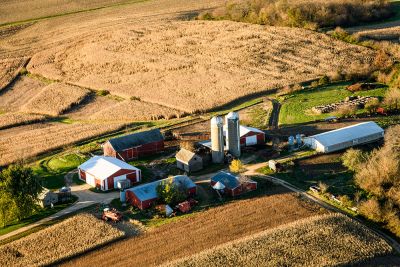The Rural Training Track Collaborative (RTT-C)—a national non-profit coalition of rural medical educators, medical schools, residency programs, researchers, and policymakers—recognized the Madison and Baraboo Residency Programs for their strong track records of training and placing physicians in rural practices.

In 2019, more than 1 in 4 or 1,502,031 people in Wisconsin lived in a rural area (University of Wisconsin Population Health Institute, Wisconsin Community Resilience and Response Task Force. 2021. A Just Recovery for Rural Equity in Wisconsin). Photo: UW-Madison.
The Rural Health Equity Track (RHET), within the Madison Family Medicine Residency Program, started in 2017 with two residents per class working at the UW Health Belleville Clinic. RHET residents provide ongoing care to a panel of patients throughout their three years of residency. Additionally, RHET residents complete 27 weeks of rural clinical training at an array of sites through various rotations and receive training specific to practicing in rural areas while gaining skills focused on population health analysis and reducing health care disparities for rural communities.
“The mission of the RHET program is to prepare residents to be community-engaged leaders and advocates in rural healthcare. We are immensely grateful to have the dedicated teaching and mentorship of rural family physicians and specialists at our rural partner sites,” says RHET Director Jillian Landeck, MD. “We are very proud of the DFMCH’s commitment to supporting rural experiences in residency training and this recognition by the RTT Collaborative which will help us to continue to attract outstanding residents.”
The Baraboo Rural Training Track (RTT) is a 1-2 model meaning residents experience one year of training in an urban setting through the Madison Residency Program and two years of training in rural settings.
A goal of both programs is to increase the number of family physicians who choose to practice in a rural location. RHET and the Baraboo 1-2 RTT were recognized by RTT-C for having a 3-year rolling average of producing more rural doctors than the average rural program. To qualify, a program must have at least 50% or three of their graduates practicing in a rural area as their initial practice location. Congratulations to the residency programs who earned Rural Recognition in 2023.
Published: January 2024
